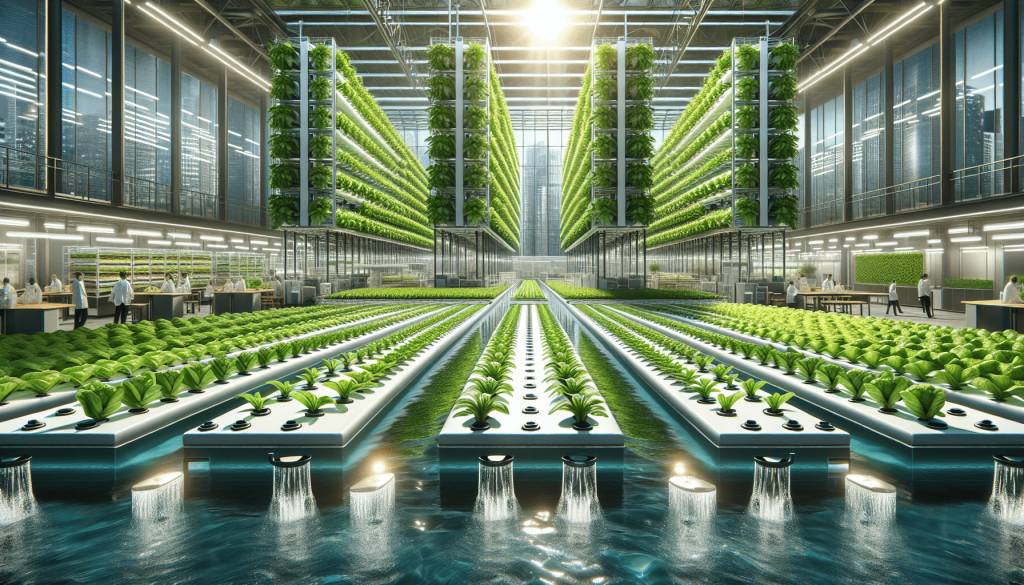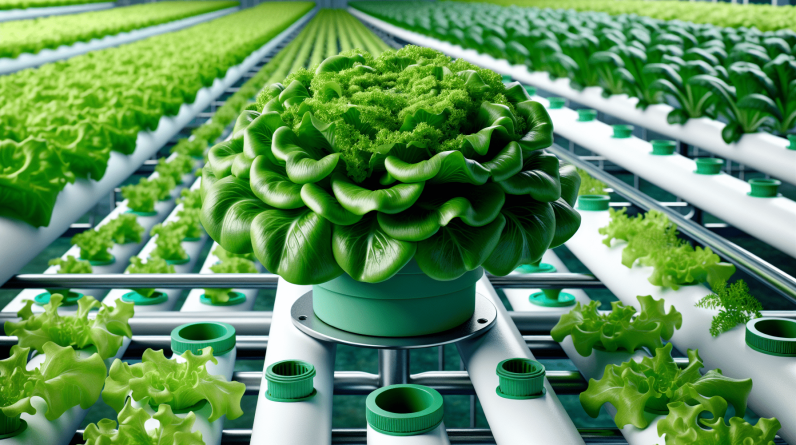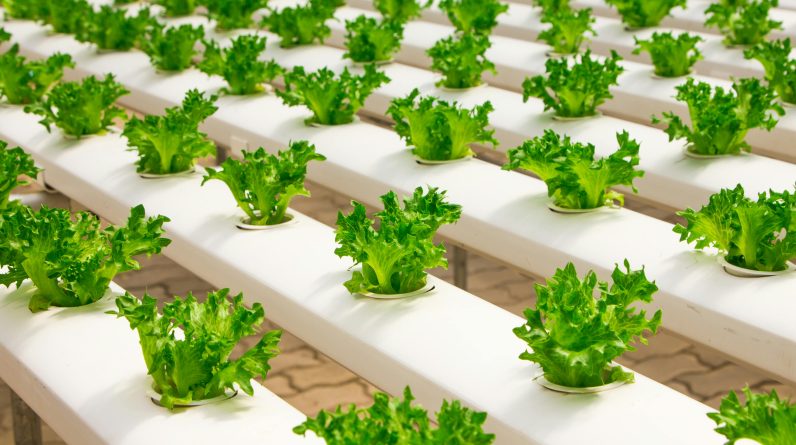
The Basics of Hydroponic Farming
If you’re new to the concept of hydroponic farming, you might be wondering what exactly it entails. Simply put, hydroponic farming is a method of growing plants without using soil. Instead, plants are grown in a nutrient-rich solution that provides all the essential elements needed for plant growth. This method allows for faster plant growth and higher yields compared to traditional soil gardening.
Benefits of Hydroponic Farming
One of the main advantages of hydroponic farming is its efficient use of water. Traditional soil gardening can be quite water-intensive, with up to 90% of water wasted due to runoff and evaporation. In hydroponic systems, water is recirculated and reused, leading to significant water savings. Additionally, hydroponic farming enables year-round cultivation, regardless of external weather conditions, making it a reliable and consistent method of growing crops.
Nutrient-Rich Solution
In hydroponic farming, plants are grown in a nutrient-rich solution that provides all the essential elements needed for plant growth. This solution typically contains a precise mix of macro and micronutrients, ensuring that plants receive everything they need to thrive. By directly delivering nutrients to the roots, plants can absorb them more efficiently, leading to faster growth and higher yields.
Different Types of Hydroponic Systems
There are several different types of hydroponic systems, each with its own unique advantages and disadvantages. Let’s explore some of the most common types of hydroponic systems used in agriculture today.
Deep Water Culture (DWC)
Deep Water Culture (DWC) is one of the simplest hydroponic systems, making it ideal for beginners. In this system, plants are suspended in a nutrient solution with their roots submerged in water. An air pump is used to oxygenate the water and prevent root rot. DWC systems are cost-effective and easy to set up, making them a popular choice for many hydroponic growers.
Nutrient Film Technique (NFT)
The Nutrient Film Technique (NFT) is another popular hydroponic system that involves a continuous flow of nutrient solution over plant roots. In NFT systems, plants are grown in channels or gutters, with a thin film of nutrient solution flowing through them. This method provides a constant supply of nutrients and oxygen to the roots, promoting healthy plant growth. NFT systems are space-efficient and ideal for growing smaller plants like lettuce and herbs.
Ebb and Flow
Ebb and Flow, also known as flood and drain, is a versatile hydroponic system that works by intermittently flooding the plant roots with nutrient solution. In this system, plants are grown in a tray or container filled with a growing medium like perlite or rockwool. Periodically, the tray is flooded with nutrient solution from a reservoir, allowing the roots to absorb water and nutrients before draining back into the reservoir. Ebb and Flow systems are easy to set up and maintain, making them suitable for a wide range of crops.
Aeroponics
Aeroponics is a high-tech hydroponic system that involves misting plant roots with a nutrient solution. In aeroponic systems, plants are grown in a vertical chamber with their roots suspended in the air. A misting system delivers a fine spray of nutrient solution to the roots at regular intervals, ensuring they receive ample oxygen and nutrients. Aeroponics is known for producing faster plant growth and higher yields compared to other hydroponic systems.

Challenges and Considerations in Hydroponic Farming
while hydroponic farming offers many benefits, it also comes with its own set of challenges and considerations that growers need to keep in mind. Let’s explore some of the common challenges faced by hydroponic farmers and how to address them.
pH and Nutrient Management
Maintaining the proper pH levels and nutrient balance in a hydroponic system is crucial for plant health and growth. pH levels that are too high or too low can prevent plants from absorbing nutrients effectively, leading to nutrient deficiencies or toxicities. Regular monitoring of pH levels and nutrient concentrations is essential to ensure that plants receive the right balance of essential elements.
Root Diseases and Pests
One of the main advantages of hydroponic farming is its reduced risk of soil-borne diseases and pests. However, hydroponic systems are still susceptible to root diseases and pests that can affect plant health and yield. Regular monitoring of plant health, sterilization of equipment, and proper hygiene practices can help prevent the spread of diseases and pests in hydroponic systems.
Temperature and Humidity Control
Temperature and humidity levels play a critical role in plant growth and health in hydroponic systems. Maintaining optimal growing conditions is essential to ensure that plants thrive and produce high-quality yields. Monitoring temperature and humidity levels, using ventilation systems, and implementing climate control measures can help create a favorable environment for plant growth.

Expert Opinions on Hydroponic Farming
To gain more insights into the world of hydroponic farming, let’s take a look at what agricultural experts have to say about this innovative cultivation method. By understanding their perspectives and recommendations, you can learn valuable tips and best practices for successful hydroponic farming.
Dr. Jane Smith, Agricultural Scientist
According to Dr. Jane Smith, an experienced agricultural scientist, hydroponic farming has the potential to revolutionize the way we grow food. She emphasizes the efficiency and sustainability of hydroponic systems, highlighting their ability to conserve water, reduce chemical inputs, and produce high yields. Dr. Smith recommends starting small and gradually expanding your hydroponic operation to gain experience and maximize success.
John Doe, Hydroponic Grower
As a seasoned hydroponic grower, John Doe has firsthand experience with the challenges and rewards of hydroponic farming. He advises aspiring growers to focus on plant health and nutrient balance, emphasizing the importance of regular monitoring and adjustments to achieve optimal growth. John also recommends investing in quality equipment and reliable nutrient solutions to ensure the success of your hydroponic venture.
Sarah Lee, Controlled Environment Agriculture Specialist
Sarah Lee, a specialist in controlled environment agriculture, believes that hydroponic farming is the future of sustainable food production. She highlights the versatility and scalability of hydroponic systems, making them suitable for a wide range of crops and growing environments. Sarah encourages growers to experiment with different hydroponic systems and techniques to find the best fit for their specific needs and goals.

Getting Started with Hydroponic Farming
If you’re ready to explore the world of hydroponic farming and start your own growing operation, there are a few key steps to consider. By following these guidelines and best practices, you can set yourself up for success and enjoy the benefits of hydroponic cultivation.
Choose the Right Hydroponic System
Before you start growing, it’s essential to choose the right hydroponic system that suits your needs and growing goals. Consider factors such as space availability, crop type, and budget when selecting a system. Research different hydroponic systems and their requirements to determine which one aligns with your resources and preferences.
Select High-Quality Equipment and Nutrients
Investing in high-quality equipment and nutrients is essential for the success of your hydroponic farm. Choose reputable suppliers and brands that offer reliable products and support services. Look for nutrient solutions specifically formulated for hydroponic growing to ensure that your plants receive all the essential elements they need for healthy growth.
Establish a Growing Environment
Creating a suitable growing environment is crucial for the success of your hydroponic farm. Ensure that your growing space has adequate lighting, ventilation, and temperature control to promote optimal plant growth. Set up a monitoring system to track environmental conditions and make adjustments as needed to maintain a healthy growing environment.
Monitor Plant Health and Growth
Regular monitoring of plant health and growth is essential to identify any issues early and take corrective actions. Keep an eye on pH levels, nutrient concentrations, and root health to ensure that your plants are thriving. Implement a monitoring schedule and record keeping system to track progress and make informed decisions about your hydroponic operation.
Experiment and Learn
Hydroponic farming is a dynamic and evolving field with endless possibilities for innovation and experimentation. Don’t be afraid to try new techniques, crops, and systems to expand your knowledge and skills. Learn from your experiences and challenges to improve your growing practices and achieve better results over time.

Conclusion
In conclusion, hydroponic farming offers a sustainable and efficient approach to growing fresh, nutritious crops that can benefit both growers and consumers. By harnessing the power of hydroponic systems, you can enjoy higher yields, faster growth, and reduced water use compared to traditional soil gardening. With the insights and recommendations of agricultural experts, you can embark on your hydroponic farming journey with confidence and success. Remember to start small, focus on plant health, and continue learning and adapting to maximize the potential of your hydroponic operation. Happy growing!










